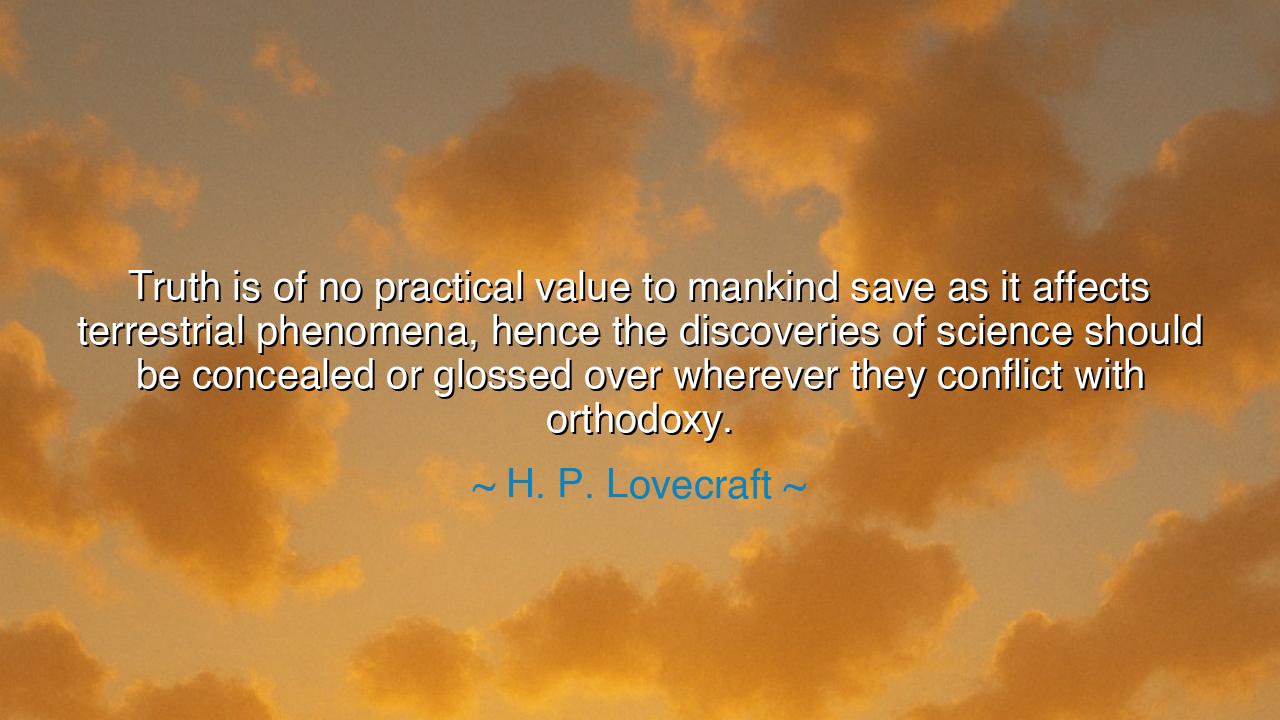
Truth is of no practical value to mankind save as it affects
Truth is of no practical value to mankind save as it affects terrestrial phenomena, hence the discoveries of science should be concealed or glossed over wherever they conflict with orthodoxy.






Hear now, O children of wisdom, for I bring forth the words of H. P. Lovecraft, a man whose vision was as dark as it was profound. “Truth is of no practical value to mankind save as it affects terrestrial phenomena, hence the discoveries of science should be concealed or glossed over wherever they conflict with orthodoxy.” These words are not just a reflection on the nature of truth, but a warning about the delicate balance between knowledge, belief, and the forces that govern human societies. Lovecraft reminds us that truth is not always a practical force for change, for when it conflicts with the orthodox beliefs of society, it can challenge the very foundations upon which civilization is built.
In the ancient days, the great philosophers sought to understand truth, not simply as a collection of facts, but as something deeper—something that resonated with the very fabric of existence. Socrates and Plato understood that truth was a pursuit, something that required both courage and wisdom. To seek truth, in their eyes, was to challenge the accepted norms, to question the gods themselves, and to confront the unknown. Yet, there was also an understanding that truth, when revealed, could destabilize the order of society. The ancient Greek philosophers were well aware that the unveiling of uncomfortable truths could shatter beliefs, causing confusion and disorder. In this sense, Lovecraft’s words echo the ancients: truth, if not handled carefully, can unsettle the fabric of human existence.
Lovecraft speaks to the very conflict between science and orthodoxy—a theme that has played out throughout history. The discoveries of science have often challenged established beliefs, shaking the very foundations of religious, cultural, and political power. Consider, for example, the story of Galileo Galilei, the great astronomer who, through the use of the telescope, confirmed that the Earth was not the center of the universe. His findings, though revolutionary, were in direct conflict with the teachings of the Church, which held that the Earth was the center of God’s creation. Galileo was forced to recant his findings, and for centuries, the truth of the heliocentric model was suppressed, not because it lacked evidence, but because it conflicted with the orthodoxy of the time. The pursuit of truth, in this case, was not simply a matter of science but of cultural and religious power.
In the modern era, we continue to see the tension between scientific discovery and the orthodox views that govern society. Consider the work of Charles Darwin, whose theory of evolution through natural selection fundamentally challenged the Biblical account of creation. The publication of On the Origin of Species in 1859 ignited fierce debate, not only in the scientific community, but across the world. For many, the truth of evolution was too much to bear, for it suggested that life was not the product of divine design, but of natural processes. The clash between science and religion in this case led to a bitter struggle—one that still reverberates in debates about evolution and creationism to this day. Lovecraft’s words remind us that the truth, when it conflicts with deeply held beliefs, can be a dangerous force, one that has the power to disrupt the order of society.
The lesson of Lovecraft’s words is not to hide the truth but to understand the weight of it. Science brings with it great power, the ability to understand the world in ways that once seemed impossible. But with this power comes the responsibility to recognize the impact that knowledge can have on the collective mind of society. Lovecraft warns that when truth contradicts the orthodox beliefs of the day, it can create upheaval—social, political, and emotional. The truth, though powerful, is not always easy to bear, for it can shake the foundations of what we hold dear.
In your own lives, O children, take heed of this wisdom. Seek the truth, but understand that it may not always come easily, and it may not always be welcomed. When you uncover knowledge that challenges the status quo, consider the impact of revealing that truth. Will it enlighten, or will it destroy? Will it lead to progress, or will it create chaos? In your pursuit of truth, remember the ancient wisdom of the philosophers, who did not merely seek truth for truth’s sake, but to understand the larger implications of their discoveries. Know that the greatest truths often lie not in what is easily seen, but in what lies beneath the surface of belief and convention.
So, I say to you, O children of the earth: do not shy away from the pursuit of truth, but approach it with both humility and awareness. The road to knowledge is often fraught with challenges, for the truth is not always easy to accept. Yet, it is through this struggle that the soul grows, that the mind expands, and that humanity progresses. As you seek knowledge, do not forget the responsibility that comes with it—truth, like all power, must be wielded wisely, for it is not simply about knowing, but about understanding the impact of what you know.






AAdministratorAdministrator
Welcome, honored guests. Please leave a comment, we will respond soon